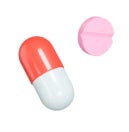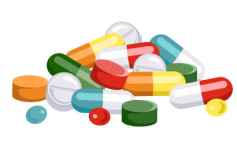Ciclosporin (Cyclosporine)
Uses
What is Cyclosporine for?
Ciclosporin is used in conditions such as Systemic Lupus Erythematosus, psoriasis and eczema and to prevent rejection of transplanted organs. It "tames" your immune system and in turn, tunes down the aggressiveness of its attack against parts of your body e.g. kidney, bone marrow, skin.
How should I take or use Cyclosporine?
- It is given orally, consistent with relation to time of day and meals. Ciclosporin is usually given twice daily.
- Your doctor will work out the correct dose of Ciclosporin for you depending on your body weight and your condition. Your doctor will also tell you how often to take your medicine. Always follow your doctor's instructions.
- For oral suspensions, you should always use the syringe provided by the manufacturer to ensure that the correct dose is taken.
- The dose will vary for each person depending on factors such as severity of your disease and your response to the treatment.
- Swallow your capsules with a glass of water. Do not break or crush them and do not take any capsules that have broken or split open.
- Treatment will continue for as long as you need the medication's effects to prevent your organs from being targeted by your immune system.
- Do not stop taking your medication without checking with your healthcare professional.
What should I do if I forget to take or use Cyclosporine?
If you forget to take a dose. take it as soon as you remember. Then take your next dose at the usual time. Do not take two doses to make up for the missed dose.
Precaution
What precautions should I take when taking or using Cyclosporine?
- Inform your healthcare professional if:
- If you have cancer, kidney problems, or high blood pressure.
- You are allergic to this medication or any of the other ingredients of this medication
- You are pregnant, planning to become pregnant, or breastfeeding.
- You are taking any other medications, including supplements, traditional medications and herbal remedies.
- Seek prompt advice from your doctor when you develop any symptoms of infection e.g. fever. sore throat, yellow/green phlegm. urinary tract infection.
- Your doctor will decide whether to stop Ciclosporin on a case-by-case basis.
- Avoid prolonged sun exposure. Use sunscreen (SPF 30 or higher) and wear protective clothing when outdoors.
What food or medication should I avoid when I take or use Cyclosporine?
- Avoid taking grapefruits, pomelo, pineapple, or starfruit during treatment with Ciclosporin.
- You should avoid live vaccines such as live polio, yellow fever, rubella (German measles), MMR (measles, mumps and rubella), typhoid and BCG (tuberculosis). Flu and pneumococcal vaccines are safe and may be given if required.
- Always check with the doctor or pharmacist first before using any medications including over-the-counter medicines.
- Do not take any supplements. alternative or herbal medicines without informing your doctor.
Side Effects
What are some common side effects of Cyclosporine?
More than 10% of people will experience:
- Increase in kidney marker
- High blood pressure
- Check your blood pressure frequently
- Headache including migraine
- May go away after a few days or with lower doses
- Tremor
- May go away after a few days or with lower doses
- Increased levels of fats (e.g. cholesterol) in the blood
- Your doctor will monitor your blood fat levels regularly
- Inflammation/overgrowth of gums
- This may appear soon after treatment is started and is more common in younger patients
- Severity depends on the condition of your teeth and whether there is proper brushing/flossing (pay particular attention to the base of the teeth)
- Visit your dentist regularly
- Hair overgrowth in male-like pattern (eg face, chest, back)
Other common side effects include:
- Nausea, vomiting, diarrhea
- Take this medication after food.
As this medication reduces your body's own defense mechanisms, your body may not be as efficient at fighting infections. You may therefore be at higher risk of infection such as infections of the brain, skin, mouth, stomach and intestines, lungs and urinary tract.
You may need to have regular blood tests as instructed by your doctor to monitor for side effects and the amount of this medication in your body.
Talk to your doctor, pharmacist or nurse if you have any side effects. This includes any side effects not listed in this leaflet. However, do not stop taking your medicine unless you have discussed this with your doctor first.
Rare but serious side-effects include:
- Jaundice (Yellowing of the skin or eye whites)
- Excessive diarrhea and/or vomiting despite taking medicine
- Unable to pass urine suddenly
The symptoms of a drug allergy include one or more of the following:
- Swollen face/eyes/lips/tongue
- Difficulty in breathing
- Itchy skin rashes over your whole body
If you experience any of these symptoms, you should stop your medication and see your healthcare professional immediately.
Handling
How should I store Cyclosporine?
Store in a cool and dry place. away from direct sunlight. Keep this medication away from children.
Leave your capsules in the foil. Only remove them when it is time to take your medicine. You will notice that they have a strong and distinctive smell.
How do I throw away Cyclosporine safely?
Pack this medication into a black trash bag and seal it tightly before throwing into the rubbish chute or bin.
Disclaimers
If you take more than the recommended dose, please seek medical advice immediately. The information provided on this page does not replace information from your healthcare professional. Please consult your healthcare professional for more information.
This article is jointly developed by members of the National Medication Information workgroup. The workgroup consists of cluster partners (National Healthcare Group, National University Health System, and SingHealth), community pharmacies (Guardian, Unity, and Watsons), and the Pharmaceutical Society of Singapore. The content does not reflect drug availability and supply information in pharmacies and healthcare institutions. You are advised to check with the respective institutions for such information.
Last Updated on October 2023

Need More Medicine?
Use Medicine Order Service on HealthBuddy.

Medicines Reminder
Get reminders and chart progress on HealthBuddy.
© 2025 SingHealth Group. All Rights Reserved.




























































